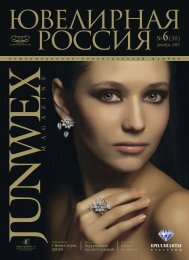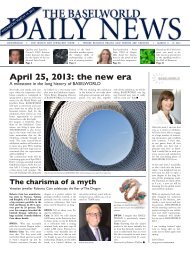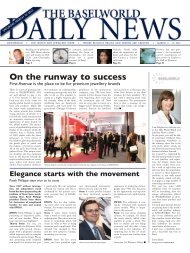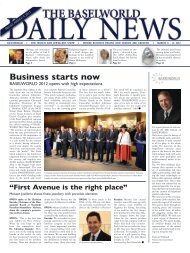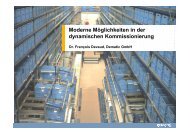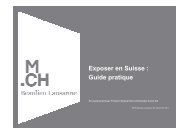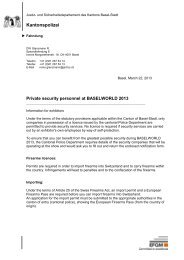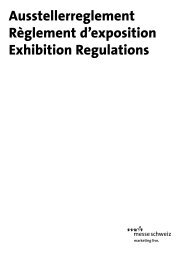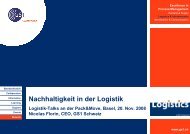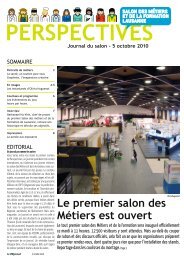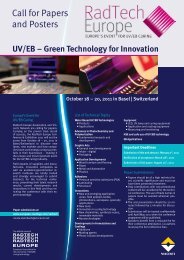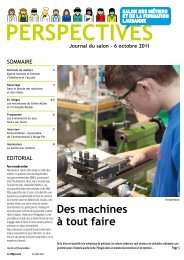MASTER MECHANICS
MASTER MECHANICS
MASTER MECHANICS
You also want an ePaper? Increase the reach of your titles
YUMPU automatically turns print PDFs into web optimized ePapers that Google loves.
4 EDITORIAL europa star<br />
“We are not in luxury.<br />
“We are in quality.”<br />
These few concise words say it all.They<br />
describe how the family owners of<br />
Hermès responded to Bernard Arnault<br />
(LVMH) at the announcement, legally<br />
necessary, that he had acquired—as<br />
secretly as it was‘amicably’—17.7 percent<br />
of the shares of their company.<br />
“We are artisans. Our goal is to make<br />
the best products in the world. We<br />
are not in luxury. We are in quality,”<br />
stated Bernard Puech, President of the<br />
board of directors of the Hermès limited<br />
partnership company. This legal<br />
arrangement guarantees control of the<br />
business to the family, the major shareholder,no<br />
matter what happens,even if<br />
the family no longer has majority control<br />
(today it holds approximately 73<br />
per cent of the company). As Bernard<br />
Puech adds, “Even it there is only one<br />
single family-held share, the family will<br />
maintain control.”<br />
We will not venture into the various<br />
possible outcomes of this ‘friendly’ hostile<br />
action, which was immediately and<br />
energetically rejected by Hermès. The<br />
brand obviously fears that the particular<br />
friendship of Arnault might become<br />
too insistent and end up suffocating it<br />
one day. But rather than focus on the<br />
strategy of the ‘kiss that kills’, let’s look<br />
at the forceful response of Hermès that<br />
differentiates ‘luxury’, of which LVMH is<br />
the most striking example, from ‘quality’,<br />
which is of a whole other order.<br />
The subtext of what Bernard Puech is<br />
saying is that quality in the long term—<br />
Hermès is in its sixth generation of managers—cannot<br />
bend to the strategic<br />
family policies of globalized finance. He<br />
goes on to emphasize in passing that<br />
“the structures that have allowed this<br />
attack are the subsidiaries of LVMH<br />
based in Luxembourg,the United States,<br />
and especially in Panama, a country<br />
that is not the most transparent when it<br />
comes to financial regulation and the<br />
source of funds.” Moreover, as the<br />
directors of Hermès are saying, beyond<br />
the financial engineering that made<br />
this happen, there is a deeper incompatibility,<br />
which is cultural. Luxury is<br />
a status; quality is a value. Luxury<br />
addresses the exterior; quality addresses<br />
the interior. Luxury is an image;<br />
quality embodies a product. Hermès,<br />
they say proudly, “is not a signature; it<br />
is a cultural soil, a culture incompatible<br />
with that of a large group.”<br />
This way of considering itself as a ‘soil’<br />
that must be cultivated to grow new<br />
fruits ‘every season’, this manner of<br />
envisioning time over the long term<br />
are culturally at odds with a financial<br />
policy that seeks, on the contrary, to<br />
annihilate time in its immediacy and in<br />
the instantaneousness of the flux of virtual<br />
transactions.<br />
Beyond the case of Hermès versus<br />
LVMH, the shock of cultures concerns<br />
all of us.The battle that is being carried<br />
out on the high-end product level is<br />
raging everywhere else as well. It is<br />
part of what we call ‘the great choices<br />
of society’. Do we want to favour the<br />
absolute race for performance, the<br />
relentless pursuit of growth at any price<br />
that demands instantaneity? Or do we<br />
opt for the ‘soil’ that will perhaps not<br />
give immediate fruits but that we can<br />
certainly cultivate for many years to<br />
come? In other words, do we want to<br />
regulate,organize and plan for the long<br />
term or do we prefer to leave everyone<br />
free to grab up as much as they can in<br />
the shortest time possible?The answers<br />
RPierre M. Maillard Editor-in-Chief<br />
are not insignificant. They will fashion<br />
the future, for better or for worse.<br />
As you can see, we are way beyond<br />
watchmaking, whether it be ‘luxury’ or<br />
‘quality’.And, having observed Hermès’<br />
activities in watchmaking, we can certainly<br />
testify that it has been this ‘culture<br />
of the soil’ that has dictated the<br />
brand’s patient growth. Step by step,<br />
without cutting corners, by planning its<br />
activities in terms of decades, and by<br />
not claiming to be something it is not,<br />
Hermès has, in thirty-two years, gradually<br />
acquired the metier of timekeeping,<br />
of which it can now rightfully be proud.<br />
The moral of this story is that the<br />
most high performance brands are not<br />
always those that claim to be. As<br />
Hermès declares, “Since going public in<br />
1993, the annual growth in net profits<br />
of LVMH has been 7.6 per cent while<br />
that of Hermès has been 14.7 per cent.<br />
The shares of LVMH have risen by a factor<br />
of six on the stock exchange—<br />
those of Hermès by 35.”<br />
The believers in the long term have<br />
thus every reason to continue to cultivate<br />
their soil.



